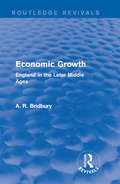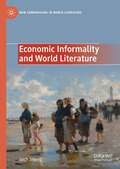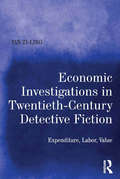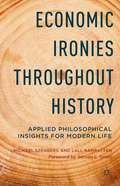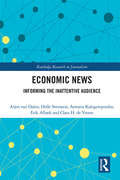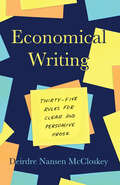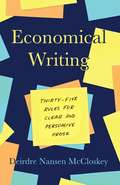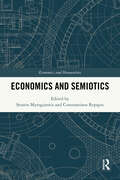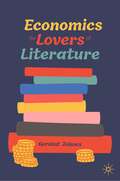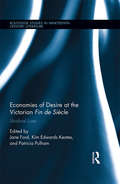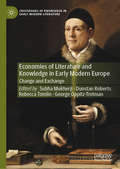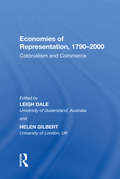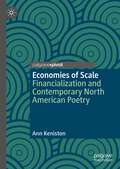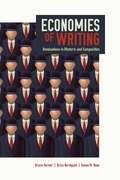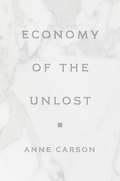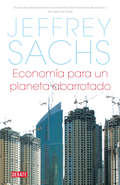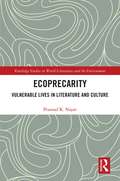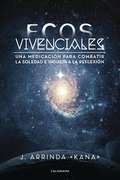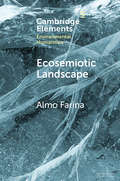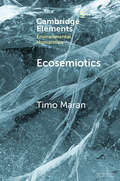- Table View
- List View
Economic Growth: England in the Later Middle Ages (Routledge Revivals)
by A. R. BridburyFirst published in 1962, this book challenges the notion that the later Middle Ages failed to sustain the economic growth of earlier centuries, suggesting that historians have been preoccupied with absolute levels of output over more important questions of output per head. It also argues they have ignored the disastrous fall in living standards in the thirteenth century and the astonishing rise that occurred later. Using national taxation records and records of urban government, as well as research from fields ranging from parliamentary history to statistics of foreign trade, the author attempts to establish that the later Middle Ages has also been wrongly defamed in political affairs.
Economic Informality and World Literature (New Comparisons in World Literature)
by Josh JewellThis book analyses the impact of economic informality on the novel form across the modern world-system, looking specifically at works by Antonio de Almeida, Machado de Assis, Dany Laferrière, Ngũgĩ wa Thiong’o, Nadine Gordimer, and Masande Ntshanga. It sees the representation of informal economies as a structural homology of world-literature. In chapters on the figure of the agregado in the nineteenth-century Brazilian novel; sex work in Haitian fiction; the politics of the informal economy in the post-apartheid South African novel; and Ngugi’s representation African occult economies, Josh Jewell explores the relationship between the rise of improvised economic activity—and its consolidation under neoliberalism in postcolonial nations—and literary form. He shows how informal economies can be grasped as locations of strategy and improvisation whose subjects must shift constantly between officialdom and underground networks; between the realms of the licit and illicit. This produces highly heterogenous narratives oscillating between different tones and registers (unserious and tragic), social spaces (working-class and elite), and conceptions of reality. By comparing the various situated aesthetics of informality, this book instrumentalises the Warwick Research Collective’s compelling but nebulous idea of a world-literature that “variously registers” a “singular modernity”.
Economic Investigations in Twentieth-Century Detective Fiction: Expenditure, Labor, Value
by Yan Zi-LingIn his study of Golden Age and hard-boiled detective fiction from 1890 to 1950, Yan Zi-Ling argues that these two subgenres can be distinguished not only by theme and style, but by the way they structure knowledge, value, and productive labour. Using the detective as a reference point and enactor of socially based interests, Yan shows that Golden Age texts are distinguished by their conservationism (and not only by their conservatism), with the detectives’ actions serving to stabilize institutions with specific ideological aims. In contrast, the criminal investigations of the hard-boiled detective, who is poorly aligned with institutions and strong interest groups, reveal the fragility of the status quo in the face of escalating cycles of violence. Key to Yan’s discussion are theories of exchange, value, and the gift, the latter of which he suggests is more akin to detective work than is wage labour. Analyzing texts by a wide range of authors that includes Arthur Conan Doyle, Agatha Christie, Dashiell Hammett, Raymond Chandler, Dorothy Sayers, Raoul Whitfield, George Harmon Coxe, and Mickey Spillane, Yan demonstrates that the detective’s truth-generating function, most often characterized as a process of discovery rather than creation, is in fact crucial to the institutional and class-based interests that he or she serves.
Economic Ironies Throughout History
by Vernon L. Smith Michael Szenberg Lall RamrattanEconomics for Alfred Marshall, the last of the classical economists, is concerned with activities in the ordinary business of life. In that milieu, we find conflicts and chaotic behavior among people, firms, and countries, which make them conduct their affairs in different, and sometimes, ironic ways. Economic Ironies Throughout History explores, explains, predicts, and harnesses these ironies for economists and scholars alike. Szenberg and Ramrattan distill their core economic ironies from a vast history of philosophy and literature that applies to economic thought. They include philosophical, psychological, literary and linguistic discussions and the personalities behind those ideas such as Socrates, Kierkegaard, Hume, Freud, Jung, Saussure, and Barthes. This book is ideal for economists as well as scholars across the business, social science, and humanities fields.
Economic News: Informing The Inattentive Audience (Routledge Research in Journalism)
by Erik Albæk Arjen van Dalen Helle Svensson Antonis Kalogeropoulos Claes H. de VreeseThis book tells the story of how the news media can help the inattentive members of the public become better educated and knowledgeable ‘economic citizens’. The authors argue that changes in the economy, journalism and consumer culture have made economic news more visible, more mainstream and more accessible. They show how economic news not only affects economic perceptions, but also interest in the economy, knowledge about the economy, and economic voting. Relying on statistical analyses, the book provides a comprehensive and systematic study of the effects of economic news.
Economic Woman
by Deanna K. KreiselThe ways in which women are portrayed in Victorian novels can provide important insights into how people of the day thought about political economy, and vice versa. In Economic Woman, Deanna K. Kreisel innovatively shows how images of feminized sexuality in novels by George Eliot and Thomas Hardy reflected widespread contemporary anxieties about the growth of capitalism. Economic Woman is the first book to address directly the links between classical political economy and gender in the novel. Examining key works by Eliot and Hardy, including The Mill on the Floss and Tess of the d'Urbervilles, Kreisel investigates the meaning of two female representations: the 'economic woman,' who embodies idealized sexual restraint and wise domestic management, and the degraded prostitute, characterized by sexual excess and economic turmoil. Kreisel effectively integrates economic thought with literary analysis to contribute to an ongoing and lively scholarly discussion.
Economical Writing, Third Edition: Thirty-Five Rules for Clear and Persuasive Prose (Chicago Guides to Writing, Editing, and Publishing)
by Stephen T. Ziliak Deirdre N. McCloskeyEconomics is not a field that is known for good writing. Charts, yes. Sparkling prose, no. Except, that is, when it comes to Deirdre Nansen McCloskey. Her conversational and witty yet always clear style is a hallmark of her classic works of economic history, enlivening the dismal science and engaging readers well beyond the discipline. And now she’s here to share the secrets of how it’s done. Economical Writing is itself economical: a collection of thirty-five pithy rules for making your writing clear, concise, and effective. Proceeding from big-picture ideas to concrete strategies for improvement at the level of the paragraph, sentence, or word, McCloskey shows us that good writing, after all, is not just a matter of taste—it’s a product of adept intuition and a rigorous revision process. Debunking stale rules, warning us that “footnotes are nests for pedants,” and offering an arsenal of readily applicable tools and methods, she shows writers of all levels of experience how to rethink the way they approach their work, and gives them the knowledge to turn mediocre prose into magic. At once efficient and digestible, hilarious and provocative, Economical Writing lives up to its promise. With McCloskey as our guide, it’s impossible not to see how any piece of writing—on economics or any other subject—can be a pleasure to read.
Economical Writing, Third Edition: Thirty-Five Rules for Clear and Persuasive Prose (Chicago Guides to Writing, Editing, and Publishing)
by Deirdre Nansen McCloskeyEconomics is not a field that is known for good writing. Charts, yes. Sparkling prose, no. Except, that is, when it comes to Deirdre Nansen McCloskey. Her conversational and witty yet always clear style is a hallmark of her classic works of economic history, enlivening the dismal science and engaging readers well beyond the discipline. And now she’s here to share the secrets of how it’s done. Economical Writing is itself economical: a collection of thirty-five pithy rules for making your writing clear, concise, and effective. Proceeding from big-picture ideas to concrete strategies for improvement at the level of the paragraph, sentence, or word, McCloskey shows us that good writing, after all, is not just a matter of taste—it’s a product of adept intuition and a rigorous revision process. Debunking stale rules, warning us that “footnotes are nests for pedants,” and offering an arsenal of readily applicable tools and methods, she shows writers of all levels of experience how to rethink the way they approach their work, and gives them the knowledge to turn mediocre prose into magic. At once efficient and digestible, hilarious and provocative, Economical Writing lives up to its promise. With McCloskey as our guide, it’s impossible not to see how any piece of writing—on economics or any other subject—can be a pleasure to read.
Economics and Semiotics (Economics and Humanities)
by Stratos Myrogiannis Constantinos RepapisEverything in our world can be interpreted as a sign. This opens up the question: How do we proceed from semantics to pragmatics, from theory to practice and vice versa? What is the nature of the relation between interpretation, action and reality? And, what can we learn by viewing economics and the economy through this lens?This volume gathers together a broad range of scholars in order to address issues relating to the intersection of economics and semiotic theory. Using concepts from the fields of economics and semiotics, the contributors to this volume revisit past and present theories and reinterpret models of thought and expression to show that our preconceptions about the economy can be fruitfully challenged and gain depth through a semiotic lens. The application of the semiotics approach to economics discourse is vital in helping us to examine topics that range from theory and economic history to the development of key economic ideas and concepts. The volume aims to enhance our understanding of how economic agents act, and our conceptualization of the economy and its cultural products can be reimagined.This volume will be of great interest to economists, literary scholars and students in the humanities.
Economics and the Historian
by Peter H. Lindert Thomas G. Rawski Susan B. Carter Jon S. Cohen Stephen Cullenberg Donald N. Mccloskey Hugh Rockoff Richard SutchThese essays provide a thorough introduction to economics for historians. The authors, all eminent scholars, show how to use economic thinking, economic models, and economic methods to enrich historical research. They examine such vital issues as long-term trends, institutions, labor--including an engaging dialogue between a labor historian and a labor economist--international affairs, and money and banking. Scholars and teachers of history will welcome this volume as an introduction and guide to economics, a springboard for their own research, and a lively and provocative source of collateral reading for students at every level. The combined research experience of these authors encompasses many varieties of economics and covers a kaleidoscopic array of nations, subjects, and time periods. All are expert in presenting the insights and complexities of economics to nonspecialist audiences.
Economics for Lovers of Literature
by Geraint JohnesThis book provides an engaging introduction to economics through a literary lens. Drawing on writers such as James Joyce, George Eliot, Edith Wharton, Jane Austen, Charlotte Bronte, and Elizabeth Gaskell, each chapter is framed around a quote from a classic text of English literature that helps tease out a key economic concept and demonstrate its broader relevance. While rigorous, the book is virtually free of technical language and aims to give a concise overview of all the main topics in contemporary economics – from supply and demand, pricing, labour markets, externalities, and game theory, to environmental and behavioural economics, fiscal policy and business cycles, modern approaches to macroeconomics and economic growth.Interweaving literary examples with easy-to-follow explanations and reflective tasks, the book takes an interdisciplinary approach to economics and literature that requires no prior knowledge in either camp, but which illuminates patterns of real-world behaviour observed by novelists and economists alike. This concise and accessible book will be a valuable tool for students embarking on introductory economics courses, economics modules in business studies, and interdisciplinary courses more broadly, as well as the general reader interested in building their knowledge of economics.
Economics of Development Course-5 Block 1-4 - Karnataka University
by Karnataka State Open University Mukthagangagothri MysoreThis educational textbook is designed for third-year Bachelor of Arts (BA) students studying in the English medium under the Karnataka State Open University (KSOU), Mukthagangotri, Mysore. It provides a structured and comprehensive approach to the prescribed curriculum, aiming to enhance students’ understanding of key literary concepts, critical analysis, and language skills. The content is tailored to suit open and distance learning methods, supporting independent study while aligning with academic standards and university requirements.
Economies of Desire at the Victorian Fin de Siècle: Libidinal Lives (Routledge Studies in Nineteenth Century Literature)
by Patricia Pulham Jane Ford Kim Edwards KeatesThis volume marks the first sustained study to interrogate how and why issues of sexuality, desire, and economic processes intersect in the literature and culture of the Victorian fin de siècle. At the end of the nineteenth-century, the move towards new models of economic thought marked the transition from a marketplace centred around the fulfilment of ‘needs’ to one ministering to anything that might, potentially, be desired. This collection considers how the literature of the period meditates on the interaction between economy and desire, doing so with particular reference to the themes of fetishism, homoeroticism, the literary marketplace, social hierarchy, and consumer culture. Drawing on theoretical and conceptual approaches including queer theory, feminist theory, and gift theory, contributors offer original analyses of work by canonical and lesser-known writers, including Oscar Wilde, A.E. Housman, Baron Corvo, Vernon Lee, Michael Field, and Lucas Malet. The collection builds on recent critical developments in fin-de-siècle literature (including major interventions in the areas of Decadence, sexuality, and gender studies) and asks, for instance, how did late nineteenth-century writing schematise the libidinal and somatic dimensions of economic exchange? How might we define the relationship between eroticism and the formal economies of literary production/performance? And what relation exists between advertising/consumer culture and (dissident) sexuality in fin-de-siecle literary discourses? This book marks an important contribution to 19th-Century and Victorian literary studies, and enhances the field of fin-de-siècle studies more generally.
Economies of Literature and Knowledge in Early Modern Europe: Change and Exchange (Crossroads of Knowledge in Early Modern Literature #2)
by Subha Mukherji Dunstan Roberts Rebecca Tomlin George Oppitz-TrotmanPlacing ‘literature’ at the centre of Renaissance economic knowledge, this book offers a distinct intervention in the history of early modern epistemology. It is premised on the belief that early modern practices of change and exchange produced a range of epistemic shifts and crises, which, nonetheless, lacked a systematic vocabulary. These essays collectively tap into the imaginative kernel at the core of economic experience, to grasp and give expression to some of its more elusive experiential dimensions. The essays gathered here probe the early modern interface between imaginative and mercantile knowledge, between technologies of change in the field of commerce and transactions in the sphere of cultural production, and between forms of transaction and representation. In the process, they go beyond the specific interrelation of economic life and literary work to bring back into view the thresholds between economics on the one hand, and religious, legal and natural philosophical epistemologies on the other.
Economies of Representation, 1790�000: Colonialism and Commerce
by Leigh DaleAlthough postcolonialism has emerged as one of the most significant theoretical movements in literary and cultural studies, it has paid scant attention to the importance of trade and trade relations to debates about culture. Focusing on the past two centuries, this volume investigates the links among trade, colonialism, and forms of representation, posing the question, 'What is the historical or modern relationship between economic inequality and imperial patterns of representation and reading?' Rather than dealing exclusively with a particular industry or type of industry, the contributors take up the issue of how various economies have been represented in Aboriginal art; in literature by North American, Caribbean, Portuguese, South African, First Nations, Australian, British, and Aboriginal authors; and in a diverse range of writings that includes travel diaries, missionary texts, the findings of the Leprosy Investigation Commission, early medical accounts and media representations of HIV/AIDS. Examining trade in commodities as various as illicit drugs, liquor, bananas, tourism, adventure fiction, and modern Aboriginal art, as well as cultural exchanges in politics, medicine, and literature, the essays reflect the widespread origins of the contributors themselves, who are based throughout the English-speaking world. Taken as a whole, this book contests the commonplace view promoted by some modern economists-that trade in and of itself has a leveling effect, equalising cultures, places, and peoples-demonstrating instead the ways in which commerce has created and exacerbated differences in power.
Economies of Scale: Financialization and Contemporary North American Poetry (Palgrave Studies in Literature, Culture and Economics)
by Ann KenistonThis book offers the first sustained study of the ways 21st century North American poems engage with financialization. It argues that recent poems about economics not only discuss but enact concerns with containment and agency essential to the contemporary financialized economy by manipulating the seemingly old-fashioned figures of synecdoche (the representation of the whole by the part) and prosopopeia or personification. Its four body chapters offer in-depth readings of the work of eleven formally, culturally, and thematically diverse contemporary U.S. and Canadian poets who variously consider labor, consumerism, debt, and the derivative form; the Coda reads several recent poems about reparations in terms of an emerging tendency to emphasize the historical, racialized, and ethical contexts of contemporary economics. As the book explores financialization’s representation in recent poetry, it redresses arguments that poetry is irrelevant to contemporary culture.
Economies of Writing: Revaluations in Rhetoric and Composition
by Bruce Horner, Brice Nordquist, and Susan M. RyanEconomies of Writing advances scholarship on political economies of writing and writing instruction, considering them in terms of course subject, pedagogy, technology, and social practice. Taking the "economic" as a necessary point of departure and contention for the field, the collection insists that writing concerns are inevitably participants in political markets in their consideration of forms of valuation, production, and circulation of knowledge with labor and with capital. Approaching the economic as plural, contingent, and political, chapters explore complex forces shaping the production and valuation of literacies, languages, identities, and institutions and consider their implications for composition scholarship, teaching, administration, and public rhetorics. Chapters engage a range of issues, including knowledge transfer, cyberpublics, graduate writing courses, and internationalized web domains. Economies of Writing challenges dominant ideologies of writing, writing skills, writing assessment, language, writing technology, and public rhetoric by revealing the complex and shifting valuations of writing practices as they circulate within and across different economies. The volume is a significant contribution to rhetoric and composition’s understanding of and ways to address its seemingly perennial unease about its own work. Contributors: Anis Bawarshi, Deborah Brandt, Jenn Fishman, T. R. Johnson, Jay Jordan, Kacie Kiser, Steve Lamos, Donna LeCourt, Rebecca Lorimer Leonard, Samantha Looker, Katie Malcolm, Paul Kei Matsuda, Joan Mullin, Jason Peters, Christian J. Pulver, Kelly Ritter, Phyllis Mentzell Ryder, Tony Scott, Scott Wible, Yuching Jill Yang, James T. Zebroski
Economy of the Unlost: (Reading Simonides of Keos with Paul Celan) (Martin Classical Lectures #14)
by Anne CarsonThe ancient Greek lyric poet Simonides of Keos was the first poet in the Western tradition to take money for poetic composition. From this starting point, Anne Carson launches an exploration, poetic in its own right, of the idea of poetic economy. She offers a reading of certain of Simonides' texts and aligns these with writings of the modern Romanian poet Paul Celan, a Jew and survivor of the Holocaust, whose "economies" of language are notorious. Asking such questions as, What is lost when words are wasted? and Who profits when words are saved? Carson reveals the two poets' striking commonalities. In Carson's view Simonides and Celan share a similar mentality or disposition toward the world, language and the work of the poet. Economy of the Unlost begins by showing how each of the two poets stands in a state of alienation between two worlds. In Simonides' case, the gift economy of fifth-century b.c. Greece was giving way to one based on money and commodities, while Celan's life spanned pre- and post-Holocaust worlds, and he himself, writing in German, became estranged from his native language. Carson goes on to consider various aspects of the two poets' techniques for coming to grips with the invisible through the visible world. A focus on the genre of the epitaph grants insights into the kinds of exchange the poets envision between the living and the dead. Assessing the impact on Simonidean composition of the material fact of inscription on stone, Carson suggests that a need for brevity influenced the exactitude and clarity of Simonides' style, and proposes a comparison with Celan's interest in the "negative design" of printmaking: both poets, though in different ways, employ a kind of negative image making, cutting away all that is superfluous. This book's juxtaposition of the two poets illuminates their differences--Simonides' fundamental faith in the power of the word, Celan's ultimate despair--as well as their similarities; it provides fertile ground for the virtuosic interplay of Carson's scholarship and her poetic sensibility.
Economía para un planeta abarrotado
by Jeffrey SachsJeffrey Sachs abre una puerta a un futuro diferente, en donde el desarrollo llega a todos los rincones de la Tierra. Nuestras ideas sobre los mercados, el poder y la soberanía nacional todavía no han aceptado las realidades de un planeta abarrotado. ¿Cómo incrementar la prosperidad económica en el mundo? ¿Cómo reducir las disparidades entre ricos y pobres y la insoportable presión sobre el medio ambiente? ¿Cómo afrontar el vertiginoso crecimiento de la población mundial y los agudos conflictos políticos y culturales que nos rodean? En este libro Jeffrey Sachs, «probablemente el economista más importante del mundo» (The New York Times), presenta una visión de cómo el pensamiento y la acción económica deben ser reformulados para responder a la realidad global, y cómo los líderes políticos, las personas y las organizaciones tienen que admitir que las reglas del juego económico han cambiado y empezar a actuar con las realidades globales del siglo XXI en la cabeza. Reseñas:«Economía para un planeta abarrotado es, al tiempo, un análisis cristalino, una síntesis, una obra de referencia, un mapa, una guía, una previsión y un resumen ejecutivo de recomendaciones fundamental para el bienestar humano.»E.O. Wilson «En esta esperada y fascinante obra, escrita con claridad y emoción, Sachs aprovecha su experiencia para ofrecer respuestas a las difíciles decisiones que el mundo debe afrontar.»Jared Diamond «Este libro es una extraordinaria herramienta para aquellos que quieran entender los cambios que traerá el siglo XXI.»Kofi Annan
Ecoprecarity: Vulnerable Lives in Literature and Culture (Routledge Studies in World Literatures and the Environment)
by Pramod K. NayarEcoprecarity: Vulnerable Lives in Literature and Culture presents an examination of ecoprecarity - the precarious lives that humans lead in the process and event of ecological disaster, and the increasing precarious state of the environment itself as a result of human interventions - in contemporary literary-cultural texts. It studies the representation of 'invasion narratives' of the human body and the earth by alien life forms, the ecodystopian vision that informs much environmental thought in popular cultures, the states of ontological integrity and genetic belonging in the age of cloning, xenotransplantation and biotechnology's 'capitalisation' of life itself, and the construction of the 'wild' in these texts. It pays attention to the ecological uncanny and the monstrous that haunts ecodystopias and forms of natureculture that emerge in the bioeconomies since the late twentieth century.
Ecos vivenciales
by J. Arrinda «Kana»Una medicación para combatir la soledad e inducir a la reflexión. <P><P>La aforística es la palabra sentida vivencialmente, no es sistematizable ni clasificable, es lo más vivencial de la experiencia humana. <P>Por ello, el aforismo se compone de fragmentos de un alma en su afección, de un alma animada en implicación y explicación: en interiorización y apertura hacia el mundo que nos rodea, sumergiéndose en las relaciones humanas en su profundidad con sus límites existenciales... <P>El lenguaje aforístico sería como una especie de fulguración de sentido donde se expresa sentimental y consentimentalmente la dimensionalidad humana en su proyección vital...
Ecosemiotic Landscape: A Novel Perspective for the Toolbox of Environmental Humanities (Elements in Environmental Humanities)
by Almo FarinaThe distinction between humans and the natural world is an artefact and more a matter of linguistic communication than a conceptual separation. This Element proposes ecosemiotics as an epistemological tool to better understand the relationship between human and natural processes. Ecosemiotics with its affinity to the humanities, is presented here as the best disciplinary approach for interpreting complex environmental conditions for a broad audience, across a multitude of temporal and spatial scales. It is proposed as an intellectual bridge between divergent sciences to incorporate within a unique framework different paradigms. The ecosemiotic paradigm helps to explain how organisms interact with their external environments using mechanisms common to all living beings that capture external information and matter for internal usage. This paradigm can be applied in all the circumstances where a living being (man, animal, plant, fungi, etc.) performs processes to stay alive.
Ecosemiotics: The Study of Signs in Changing Ecologies (Elements in Environmental Humanities)
by Timo MaranThis Element provides an accessible introduction to ecosemiotics and demonstrates its pertinence for the study of today's unstable culture-nature relations. Ecosemiotics can be defined as the study of sign processes responsible for ecological phenomena. The arguments in this Element are developed in three steps that take inspiration from both humanities and biological sciences: 1) Showing the diversity, reach and effects of sign-mediated relations in the natural environment from the level of a single individual up the functioning of the ecosystem. 2) Demonstrating numerous ways in which prelinguistic semiotic relations are part of culture and identifying detrimental environmental effects that self-contained and purely symbol-based sign systems, texts and discourses bring along. 3) Demonstrating how ecosemiotic analysis centred on models and modelling can effectively map relations between texts and the natural environment, or the lack thereof, and how this methodology can be used artistically to initiate environmentally friendly cultural forms and practices.
Ecosickness in Contemporary U.S. Fiction
by Heather HouserThe 1970s brought a new understanding of the biological and intellectual impact of environmental crises on human beings, and as efforts to prevent ecological and human degradation aligned, a new literature of sickness emerged. "Ecosickness fiction" imaginatively rethinks the link between ecological and bodily endangerment and uses affect and the sick body to bring readers to environmental consciousness.Tracing the development of ecosickness through a compelling archive of modern U.S. novels and memoirs, this study demonstrates the mode's crucial role in shaping thematic content and formal and affective literary strategies. Examining works by David Foster Wallace, Richard Powers, Leslie Marmon Silko, Marge Piercy, Jan Zita Grover, and David Wojnarowicz, Heather Houser shows how these authors unite experiences of environmental and somatic damage through narrative affects that draw attention to ecological phenomena, organize perception, and convert knowledge into ethics. Traversing contemporary cultural studies, ecocriticism, affect studies, and literature and medicine, Houser juxtaposes ecosickness fiction against new forms of environmentalism and technoscientific innovations such as regenerative medicine and alternative ecosystems. Ecosickness in Contemporary U.S. Fiction recasts recent narrative as a laboratory in which affective and perceptual changes both support and challenge political projects.
Ecosickness in Contemporary U.S. Fiction: Environment and Affect (Literature Now)
by Heather HouserThe 1970s brought a new understanding of the biological and intellectual impact of environmental crises on human beings. As efforts to prevent ecological and bodily injury aligned, a new literature of sickness emerged. "Ecosickness fiction" imaginatively rethinks the link between these forms of threat and the sick body to bring readers to environmental consciousness. Tracing the development of ecosickness through a compelling archive of contemporary U.S. novels and memoirs, Ecosickness in Contemporary U.S. Fiction establishes that we cannot comprehend environmental and medical dilemmas through data alone and must call on the sometimes surprising emotions that literary metaphors, tropes, and narratives deploy. In chapters on David Foster Wallace, Richard Powers, Leslie Marmon Silko, Marge Piercy, Jan Zita Grover, and David Wojnarowicz, Heather Houser shows how narrative affects such as wonder and disgust organize perception of an endangered world and orient us ethically toward it. The study builds the connective tissue between contemporary literature, ecocriticism, affect studies, and the medical humanities. It also positions ecosickness fiction relative to emergent forms of environmentalism and technoscientific innovations such as regenerative medicine and alternative ecosystems. Houser models an approach to contemporary fiction as a laboratory for affective changes that spark or squelch ethical projects.
